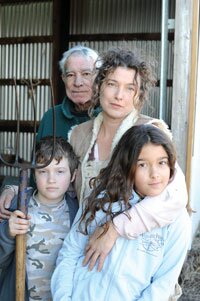 With less than two months left on her land lease, farmer Connie Hicks is desperate to find a new home for her cattle operation.
PHOTO BY JEN FARIELLO
With less than two months left on her land lease, farmer Connie Hicks is desperate to find a new home for her cattle operation.
PHOTO BY JEN FARIELLO
Forget Pop Tarts and Cocoa Krispies. These days, some children are more likely to beg for "Toaster Pastries" or "Koala Crisp," the organic versions of the popular Kellogg's treats. Locally grown food, too, has exploded out of its niche at the City Market and at stores like Rebecca's Natural Foods and is now popping up on shelves in places such as Reid's Super Save Market, where it once would have seemed as out of place as Donald Trump at a flea market.
The increase in supply and the ease with which shoppers can now fill their baskets with locally grown and raised veggies and meats is thanks to growing consumer awareness of the benefits such local food provides not only for health but also for the environment and for our now tanking economy.
According to the Piedmont Environmental Council, the average distance food travels before landing on dinner plates is a tortuous 1,500 miles. And according to the Virginia Cooperative Extension, if every Virginia household spent just $10 a week on locally produced food, it would add a whopping billion dollars to the state's economy every year.
To help bring this about, several new organizations are working to connect farmers to consumers, and "beyond organic" farmer Joel Salatin, founder of Polyface Farms in Swoope, Virginia, will be speaking at two upcoming events aimed at increasing awareness among Central Virginia landowners and food consumers of the value of contributing to the local food chain.
"There are so many opportunities for farmers right now," Salatin insists.
But despite Salatin's optimism-- and the clear demand for local food in Charlottesville-- one local cattle farmer says her way of life has gone from hard to nearly impossible in Albemarle County, where pastureland is becoming scarce, thanks to development and to new landowners who seem more interested in manure-free country getaways than in living alongside the day-to-day operations of a working livestock farm.
The end of a way of life?
Her Ford 350 bouncing over ruts as she heads toward a herd of peacefully grazing black angus cattle, 42-year-old Connie Hicks throws her head back and laughs as a reporter clinging to the hay-rolling apparatus on the back of the lurching truck shrieks and is nearly thrown to the ground.
"You gotta be tough to be a farmer," Hicks shouts through the open rear window of the truck's cab. She should know: a fourth generation farmer, Hicks grew up tending cattle, mending fences, and rolling hay with her father and grandfather on more than a dozen farms in Albemarle County. She continued to work with her father, Conrad Hicks, as an adult, planning to take over the operation when he retired.
That day came sooner than anyone expected, when Conrad fell off a baler onto a concrete slab two years ago at age 75 sustaining a life-altering head injury that coincided with the onset of Alzheimer's.
Although her father still enjoys spending time in the fields with his daughter, the family farming operation fell to Hicks, who has worked alone since then to manage a herd of more than 200 cattle and had hoped to eventually pass the family farming tradition along to her 8-year-old son, Gage.
But life as she knows it may soon end: the lease on a 500-acre tract in Free Union-- the Hicks' last remaining farm-- is up at the end of April, and Hicks, despite her family's long farming history in this area, has been unable to secure a new lease despite an increasingly desperate search.
"I'm going to have to sell them all," says Hicks, all traces of laughter erased as she tosses hay to about two dozen cows and calves milling around her in the field. "I've raised them all since they were babies," she says softly. "It's devastating."
If life as a farmer has always been hard, these days, says Hicks, it's brutal. Land prices in Albemarle have skyrocketed since her childhood, making it impossible for most cattle farmers who haven't inherited a farm to purchase their own land. Development has steadily gobbled land once leased to raise livestock. On any drive along meandering county roads, there are clues hinting at the agricultural history of the land in the names of the new developments: Cory Farm, Blandemar Farm Estates. Despite the F-words, there are no cows on these tracts.
Not alone
Hicks isn't the only cattle farmer who has struggled to find land in the county. Ramona Huff, owner of Gryffon's Aerie, says she feared she'd have to shut her grass-fed beef business down when she lost her lease in 2007.
"We looked for about eight months," says Huff, a former advertising exec who turned cattle farmer in 1999 with the goal of supplying "superior" grass-fed beef.
"We were out there saying, 'We don't want a free ride. We will pay top dollar,'" Huff recalls. "Even saying that, it was still really hard to find."
Fortunately, Huff and her husband, Collins, connected with the owners of Mount Air Farm, another grass-fed cattle business on Brown's Gap Turnpike past White Hall.
"They'd used our bull a couple of years," says Huff. "When they decided to close down their operation, they said, why don't you move the whole shooting match?"
An added benefit of the move was Mount Air's already established on-site market, which is open on Saturdays. Huff says beef business has been brisk.
"People are willing to come out here," she says. "People don't mind the inconvenience."
Huff believes her good fortune in finding a new lease-- and in having people willing to come to her-- stems from the care with which she approaches farming.
"Farmers have to take pride in what they do," she says. "I'm conscious of where I drive my tractor when it's muddy. I'm very conscious of where I feed cattle in winter because I'm renting someone else's land."
As for selling her meat on site, she says, "People expect things to be beautiful. They don't want to see a lot of crud laying around."
Huff's advice mirrors that of Joel Salatin, author of books on farming and owner of Polyface Farms, where he has an "open door" policy, welcoming visitors to see any facet of his farming operation during operating hours Monday through Saturday.
Salatin says the key to convincing landowners to allow farming is to show them the benefit.
"Right now," he says, "I can't imagine one of our landlords kicking us off because all of them are so pleased with the healing that they see on the land."
Among signs of healing, he says, are "thicker, greener grass, fewer weeds, no thistles," traits he attributes to "very intensive managed grazing" in which he moves cattle regularly and lets his chickens follow behind to aerate the manure to help fertilize.
Salatin's success would be hard, if not impossible, to rival. His meat-- beef, pork, chicken and rabbit-- is featured on a slew of area restaurant menus, and he scored a national first: getting local meat into a fast food restaurant, when Chipotle Grill in the Barracks Road Shopping Center began using his pork last year.
Like Huff, who will share the stage with him at a March 7 panel discussion on farming at PVCC, Salatin says land owners need to be taught "not to be fearful of farmers."
At the upcoming events, he says, "I'm going to be talking about things to look for in a farmer, both character and whatever his home base is, so that you as a landowner aren't getting a pig in a poke." (The second Salatin event will be held March 14 at the Montessori Community School on Pantops. See box for details.)
Among criteria landowners should use when seeking out a farming tenant, says Salatin: "look at their fields and see if that's the way you'd like your place to look, including looking at their fences. Look at their animals, look at what they're currently doing."
Beyond that, he says, landowners should educate themselves about "landhealing farming" so they can be more discerning about the farmers they rent to.
Farm to table
While Salatin and Huff are already succeeding in getting their product to market, two new organizations have sprung up specifically to address small farmers' need to reach consumers in a broader and more consistent way.
The Local Food Hub is the brainchild of local wine grape-grower Marisa Vrooman and Kate Collier, owner of the Feast! gourmet shop on West Main Street. The Food Hub will be a food distribution service that Collier hopes will solve one of the main difficulties faced by small farmers: providing a stable clientele that the farmer can count on. By carrying $3 million liability insurance-- and by providing food "traceability"-- the Local Food Hub will meet requirements of large food distributors and institutions like UVA, which recently announced an ambitious plan to increase its portion of locally grown food to 25 percent in its food services division.
"The Food Hub will be a large customer to these farms," providing some financial stability, says Collier, who hopes that level of support will help younger people enter the farming industry.
"It's time to get a new generation going," says Collier, who cites a Piedmont Environmental Council datapoint that the average age of Albemarle County farmers is 59.
Collier recently lost a battle to win a portion of a $250,000 fund designated by Albemarle County for economic development. Although the County rejected the Hub's appeal, the publicity generated by the effort served a purpose.
"We've raised $165,000," exclaims Collier, who says that amount puts the nonprofit Hub within $65,000 of its stated $230,000 needed to launch in June.
Ted Corcoran and Neal Halvorson-Taylor are also getting in on the local food action with the web-based local food business Virginia's Bounty. Like the Food Hub, Virginia's Bounty asked the County for funding assistance, and was rejected. Their start-up costs, however, are significantly lower-- requiring mostly labor to get an interactive website up and running and to recruit farmers.
The site-- virginiabounty.com-- will allow consumers to order specific foods and quantities from local farmers, who will sell their wares through the site, and then Virginia's Bounty will arrange for pick-up spots around town.
Collier and Halvorson-Taylor both say there is plenty of room in the market, and that neither new business should interfere with Community Supported Agriculture outfits like Horse & Buggy and The Best of What's Around, just two of the half dozen or so CSAs which provide a weekly dose of produce for an up-front fee.
Virginia's Bounty, says Halvorson-Taylor, is "for those who don't want to make the upfront investment, who may not be around here every week."
Land-locked
These connecting services will be a boon to farms that have a ready-to-eat product to sell. But for Hicks and other cattle farmers who don't have their own beef label like Polyface or Gryffon's Aerie, the efforts won't help-- at least not immediately.
Hicks-- like most Virginia cattle farmers-- makes her money by selling calves at auction. Those calves are sent to feedlots or to larger farms, where most are grain-fed and then slaughtered for meat.
"I really want to start my own label," says Hicks. But without a farm on which to raise the cattle, there's little hope of that dream being realized.
Finding land is not the only problem Hicks is facing. After her father's injury, Hicks' mother wanted to sell her the remaining farm property including tractors, hayloading trucks, and balers. Hicks says that the value of the property is approximately $500,000, and her mother needed only $100,000 to pay off the remaining loans.
"Farm Credit turned me down," says Hicks, who says the rejection was based on her tax return showing meager earnings and that they ignored the collateral she offered, including the equipment and the equity in her own house. "They don't help farmers," Hicks insists.
Representatives from Farm Credit did not immediately return the Hook's call.
Dan Maupin is another Albemarle County cattle farmer feeling the pinch. At 83, Maupin is still working his farm full time, but he says it gets harder to make a living year by year.
"Fertilizer is way up," he says, while the price of calves has declined over the last year from a high of about $1.65 a pound to the current rate of about $1.
He's also afraid that Albemarle County might do away with some of the Land Use Taxation, which grants a reprieve to landowners who use their property for some type of agricultural business.
"That would be really hard to take," he says, of the potential soaring cost in land taxes.
According to County Assessor Bob Willingham, the county has 5,000 properties in Land Use, which translates into a loss of millions of dollars in potential tax revenues. But despite regular discussions at budget time, Albemarle County Supervisor Ann Mallek says the Board has no intention of getting rid of land use taxation. It did, however, recently pass an ordinance requiring "revalidation" of land use every two years. Property owners who are enrolled in the Land Use program will be required to provide proof of how the farm has been used.
Hicks points out that Land Use-- while a boon to farmers-- also provides the perfect justification for wealthy estate owners to reject livestock operations. By rolling hay that is sold to feed livestock, the owners of plush estates can qualify for the same tax break as if they had cattle on their land.
That, says Hicks, is what happened at Jumping Branch Farm on Garth Road across from Foxfield where Hicks and her father kept cattle for years and where the former owner still remembers them fondly.
"I cannot speak too highly of them," says former Jumping Branch owner Elizabeth Hamilton of Connie and Conrad Hicks, who ran cattle on her land until she sold the farm following the death of her husband, Howard Hamilton. "My husband," she adds, "was extremely pleased with every phase of the cattle operation."
The new owner of Jumping Branch, Ted Weschler, (a part-owner of this newspaper) says the decision to shun cattle was family preference. Ironically for someone who benefits from Land Use, he questions the wisdom of the County offering him such a tax break, even as he takes advantage of it.
"I don't consider myself a farmer," he says, "and to get the benefit as though I'm a farmer doesn't strike me as right."
Right or not, Weschler's far from the only estate owner getting the tax break for rolling hay. Hicks says CNET founder Halsey Minor and author John Grisham are two others. (Neither returned the Hook's calls by presstime.)
Hicks, for one, wishes some of them would reconsider their position and invite her and her cows onto their land.
"Farming's in my blood," she says. "It's all I've ever wanted to do."
If she doesn't find land soon, she says, she'll be facing a very different future than the one she had planned for herself and her son, following the seasons and living close to the land.
"I guess I could work at Target?" she ponders, before the reality of that thought seems to sink in, and she exhales: "Oh, God, I don't know what I'll do."
CORRECTION: The print version of this story gave an erroneous name for the bank that rejected Hicks' request for a loan. It has been corrected online. In addition, the original version incorrectly named Bundoran Farm as a cattle-free development. It is home to more than 200 cattle. Finally, an additional quote by former Jumping Branch farm owner Elizabeth Hamilton has been added online to clarify the context of her original statement.--ed.
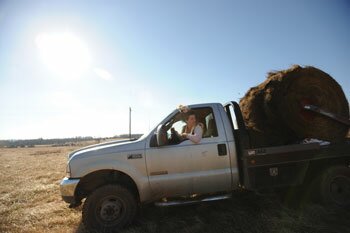
Connie Hicks took over the family farming business after her father, Conrad Hicks, suffered a farming accident brain injury.
PHOTO BY JEN FARIELLO
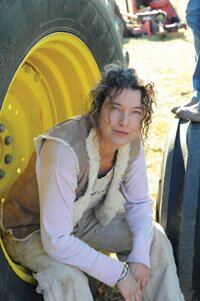
Hicks, 42, has single-handedly managed a farm of over 200 cattle on a 500-acre Free Union property.
PHOTO BY JEN FARIELLO
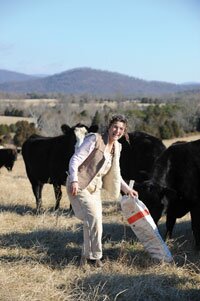
Hicks has aspirations to start her own beef label--- but without the necessary land resources, it's a dream that may not come true.
PHOTO BY JEN FARIELLO>
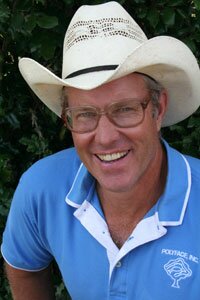
Polyface Farms founder Joel Salatin will speak at two events in March aimed at raising awareness among landowners of the value of farming on their properties.
PHOTO COURTESY POLYFACE FARMS
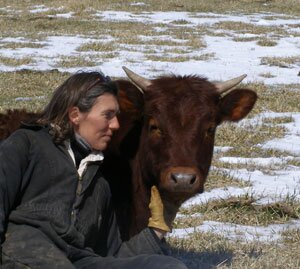
"Farmers have to take pride in what they do," says Gryffon's Aerie owner Ramona Huff. "I'm conscious of where I drive my tractor when it's muddy. I'm very conscious of where I feed cattle in winter because I'm renting someone else's land."
PHOTO COURTESY GRYFFON'S AERIE
#